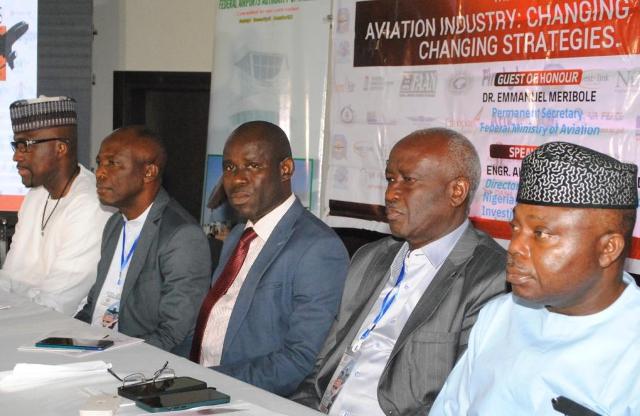
The director general of the Nigerian Civil Aviation Authority (NCAA), Capt Musa Nuhu has urged the domestic airline operators to manifestly embrace collaboration and exhibit sustained commitment lest average Nigerian carrier will be more fragmented and less competitive with mere individual identities.
Nuhu gave the advice in his keynote address at the 27th edition of the League of Airport and Aviation Correspondents (LAAC) annual conference held yesterday in Lagos under the theme ‘Aviation Industry: Changing Times, Changing Strategies.’
The director general who was represented by the director of airworthiness and standards, Mr Gbolahan Abatan, said synergy, collaboration, cooperation or merger are the drivers of growth in the airline sector of the aviation industry and urged airlines “to partner with their willing foreign counterparts through code sharing in developing Nigeria’s aviation industry.”
He recalled that Air France interlined with Aero Contractors.
“As aviation is global we have no choice than to keep aviation working by adopting workable initiatives and rightful changing strategies to contend with ever-changing times,” he said.
He applauded some domestic carriers which, in 2022 launched a “revolutionary initiative” tagged ‘Spring Alliance’ to “mutually support one another’s operations and improve service delivery for the mutual benefit of the passengers and the airlines alike.”
“Even though the ‘Spring Alliance’ was Nigerian initiative, there is window for other like-minded airlines around the world to key into the scheme. Efficiency is the barometer for success in the industry as airlines’ on-time-performance is an indispensable condition.
“Without any iota of doubt, such landmark passenger-centric initiative will bring about sustainability and stability of airlines operations in terms of connectivity, low capacity and enhancement of seamless facilitation, thereby preventing flight delays and cancellations. Even though the phenomenon of delays is global, we are poised to minimize the number of delays to the simplest minimum,” he added.
For the fact that the global airline industry is one of the most competitive industries, Nuhu said it has become inevitable for the local carriers to effective tap into its huge market opportunity through cooperative behaviour and alliances as it is prevalent in other climes.
“In actual fact, the first large alliance began in 1989 with large-scale code sharing between Northwest Airlines and KLM. As of now, there are three global airline alliances operating in the air travel industry, namely: Star Alliance, SkyTeam, and Oneworld. Members of SkyTeam are Air France-KLM, Delta Virgin Atlantic; Under Oneworld we have American Airlines, British Airways and Iberia; and under Star Alliance, which is world’s largest global airline alliance, we have United Airlines, Air Canada and Lufthansa,” he said.
He said the theme of the conference ‘Aviation industry: Changing times, changing strategies’ “is very apt on account of outstanding changes and paradigm shift in our nature and approach to aviation business vis-a-vis technology, airline management and operations, financing and other aspects of the aviation industry.”
He said the world is dynamic just like any other human endeavour, including aviation.
“As time changes so are strategies to be deplored. Expectedly, as the largest black nation in the world and according to data released by the World Bank, Nigeria’s economy is the largest on the continent of Africa for the fifth consecutive year in 2022 with a nominal GDP of $477.4 billion.
“The airline industry in Nigeria, which currently contributed over $1.7 billion as well as supports over 240,000 jobs directly and indirectly, transformed to a more competitive market following its deregulation for a couple of decades ago,” he added.
Considering that air transport has become very critical now due to other challenges of travelling by road, the director general said “there is growing demand for aviation services which has encouraged many airlines to establish or plan to establish operations in Nigeria.”
On the one hand, he said the industry is battling with a string of challenges ranging from regulatory, institutional and structural challenges, while on the other, he said “it is expected to experience significant improvements in areas of safety, security, technology, development infrastructure, airline management and operations among others.”
As time evolves, Nuhu said the domestic carrier operators “are moving away from poor choice of aircraft, poor or bad route planning and operating models.”
“Following the outbreak of the devastating pandemic which almost brought humanity to its knees, many Nigerian airline operators cutting across established and new entrants are appreciating the economics or intrinsic benefits of operating newer and narrow-body aircraft or single-aisle aircraftlikeBoeing 707, Boeing 727, Boeing 737, Boeing 757, Airbus A320 and Embraer E-Jet families as their immediate recovery and survival strategy.
“As aviation is global we have no choice than to keep aviation working by adopting workable initiatives and rightful changing strategies to contend with ever-changing times,” Nuhu added.

























































